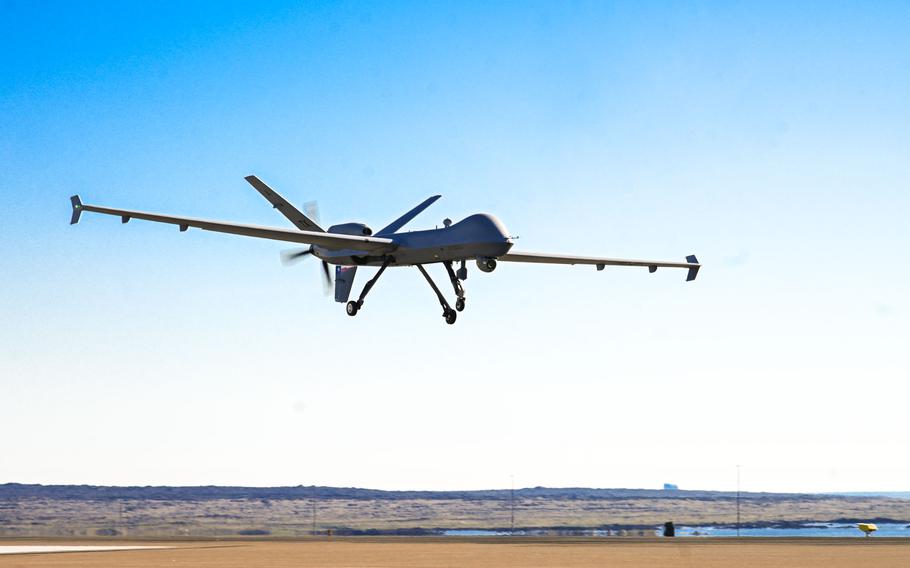
An Air Force MQ-9 drone approaches Keflavik Air Base, Iceland, during a training exercise on May 20, 2025. (Asiah Phillips/U.S. Air Force)
KAISERSLAUTERN, Germany — Two Yemeni men whose relatives were killed in a U.S. drone strike over a decade ago lost their bid to hold Ramstein Air Base host country Germany partly responsible.
A ruling Tuesday by Germany’s highest court dismissed the complaint by Ahmed and Khalid bin Ali Jaber, who argued that allowing U.S. drone operations in Yemen to be supported via Ramstein violated international law.
They asked the Federal Constitutional Court to require Germany to block use of a U.S.-operated satellite relay station on base for lethal operations abroad. The plaintiffs also contended in the complaint that Germany had failed to protect their rights.
In its decision, the high court did not say whether Germany bears responsibility for U.S. drone strikes but concluded that the threshold for legal action had not been met.
Two of the bin Ali Jabers’ relatives were killed in a 2012 U.S. drone strike on the village of Khashamir, in eastern Yemen. Al-Qaida was said to be the target of the strike, which sparked outrage because one of the victims was an outspoken opponent of the militant group.
The German Defense Ministry raised no objections when it was informed by U.S. forces in 2010 and 2011 about plans to construct a satellite relay station at Ramstein, according to court documents.
The system enables control signals sent from the United States by trans-Atlantic fiber-optic cable to be relayed by satellite to drones in the Middle East and other regions, a workaround made necessary by the curvature of the Earth.
The high court held that while Germany has a general duty to protect fundamental rights and uphold international humanitarian law, that duty becomes a concrete legal obligation only when there is a sufficient connection to German state authority and a serious risk of systematic violations of international law.
Tuesday’s ruling spells the end in domestic courts of a legal dispute dating to 2014. An administrative court initially dismissed the bin Ali Jabers’ lawsuit seeking to block U.S. drone use of the relay station.
But a higher court later ruled partially in their favor, ordering the German government to ensure that American drone operations conducted via Ramstein complied with international law.
On appeal, the Federal Administrative Court overturned the decision and reinstated the dismissal of the complaint. The plaintiffs then turned to the high court.
They argued that the drone program operated by U.S. personnel does not adequately distinguish between military targets and civilians, according to court documents.